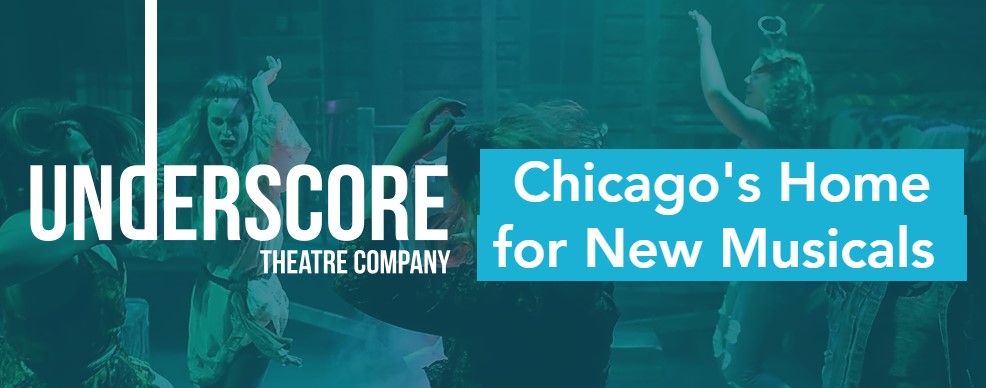Next, we chatted with Whitney Rhodes, the Artistic Director at NAMT member Underscore Theatre Company. In addition to an upcoming world premiere production of Notes & Letters by Annabelle Revak, the company is also producing the 6th Annual Chicago Musical Theatre Festival next month.
New musicals are the key focus of Underscore Theatre Company’s mission; tell us a little more about that mission, and what opportunities are offered to writers and composers through Underscore’s programs.
Underscore is committed to the development of new musicals and supporting writers in their process of realizing their show from the very beginning stages to an early production. Our programming includes developmental readings and workshops; Writer’s Nights, in which writers gather to share new material and gain feedback from one another in a safe and communal environment; our Tiny Store Front Concert Series which offers themed concerts featuring new musical theater music as an opportunity for additional artist exposure; and of course our annual Chicago Musical Theatre Festival and two mainstage productions that bookend our seasons. Additionally, we have recently launched the Underscore pipeline—the idea with the pipeline is that we begin our relationship with a show and its writers at the reading stage, take it through a developmental workshop and then produce it on our mainstage. Our hope is in this process we are able to give writers as much support as we can for them to hear and see and experiment with their work so that by the time it hits the mainstage, it is as strong a product as it can be at that time.
The next world premiere Underscore is presenting is Notes & Letters. How did this piece first find its way to you, and more generally, how do you choose what new musicals to program in your season?
Annabelle Revak is the writer of Notes & Letters and she has been a friend of the company for a long time as our Literary Manager, a Music Director and a composer/writer of many Tiny Store Front songs, so we are familiar with her work. Seasons are programmed by our Ensemble—twice a year we sit with what has been submitted (we have a rolling deadline), and our literary team presents our Ensemble with the strongest options based on the scripts they have read and evaluated. We then dive into discussions about what stories feel best for us to be telling. It’s definitely a collaborative process.
What developmental work have you with the writer done in preparation for the upcoming production of Notes & Letters?
Notes & Letters has been a part of the Underscore pipeline so we first experienced the show in a reading at the Chicago Musical Theatre Festival in 2019; we then did a workshop this past summer and now we will put it on our mainstage this spring.
Your 2020 Chicago Musical Theatre Festival is also coming up in February! Can you tell us a bit about your Festival?
This is our 6th Chicago Musical Theatre Festival and we’ll be featuring eight productions, two readings and a 10-minute musical showcase (this is in partnership with the Chicago Dramatists). CMTF exists to be another platform for new musical theater to live. We bring five judges into the process as well, with varying backgrounds—producers, folks attached to licensing houses, artists and educators—who provide feedback to the writers and also help identify show and individual awards at the conclusion of the festival. With the recent, sad closing of NYMF, we realize the importance of continuing to responsibly and successfully have this opportunity available. We will be doing a deep dive after this festival to reflect on how we can best serve the larger field through CMTF.
Why should everyone make their way to Chicago to check out the exciting new work happening at Underscore?
I think the work that happens at Underscore is so important to bringing new stories to the cannon—and audiences are a key piece to the puzzle. The truth is, so few companies are dedicated to the development of new musical theatre because it is hard and expensive. Though we have limited resources, I think our production quality is really strong for what we are able to provide, the Chicago talent onstage and behind the scenes is truly extraordinary, and the majority of what you experience with us will be something you’ve never seen before. It’s something really special to watch theater grow and change and feel like you were a part of it at the very beginning. New stories have to start somewhere—and not everyone has access to the larger theater companies or big name producers. I think we’re occupying a really valuable space in the field to give opportunities to storytellers who are emerging and need a safe space to grow. And like I said before, we need audiences to help be a part of that growth.
For more information about Underscore Theatre company and their upcoming programming, please visit their website.


